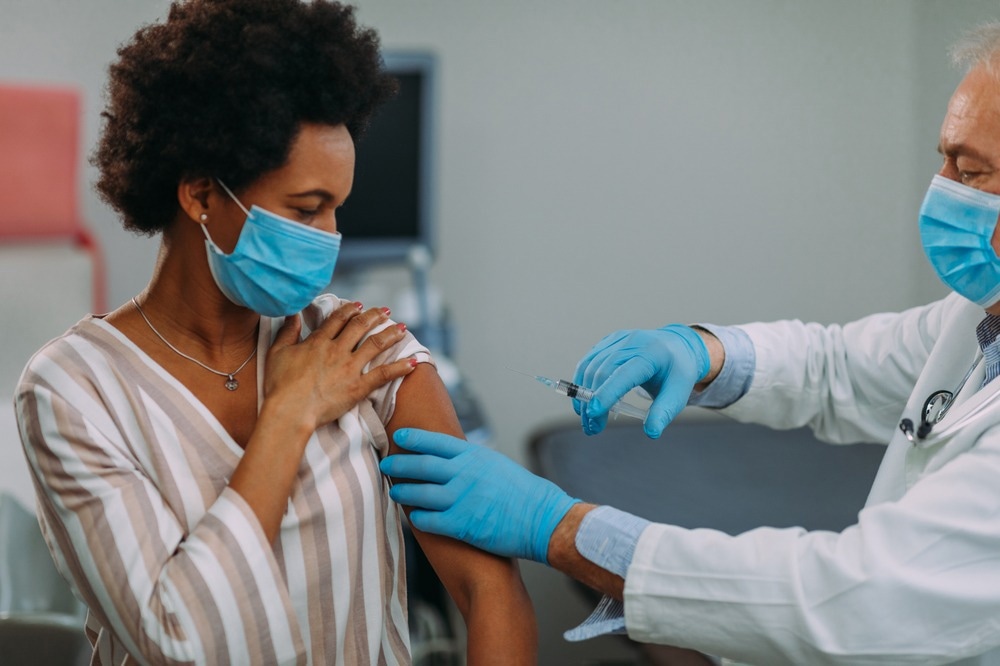The ongoing coronavirus disease 2019 (COVID-19) pandemic, caused by the rapid outbreak of the severe acute respiratory syndrome coronavirus 2 (SARS-CoV-2), has severely affected the global economy and healthcare system. COVID-19 vaccination has proved to be effective in controlling the pandemic.

Study: Risk of COVID-19 among unvaccinated and vaccinated patients with systemic lupus erythematosus: a general population study. Image Credit: bbernard / Shutterstock.com
Background
SLE patients often experience poor outcomes due to immune dysfunction, increased levels of COVID-19 binding receptors, immunosuppressive medication, and frequent comorbidities such as renal and cardiovascular diseases. Although many studies have analyzed the risk of COVID-19 in patients with SLE, the findings were inconsistent.
Since most of these studies were conducted before the availability of COVID-19 vaccines, it is imperative to understand how vaccination affects the risk of severe sequelae of COVID-19 in SLE patients. Furthermore, there remains a lack of research on SARS-CoV-2 breakthrough infection and the risk of sequelae in patients with SLE.
About the study
The current study used data from The Health Improvement Network (THIN) database, which is an electronic medical record database from general practitioners (GPs) in the United Kingdom. THIN provides medical, anthropometrics, lifestyle, and sociodemographic data of around 17 million U.K. residents.
In this study, two retrospective cohorts were compared to assess the risk of SARS-CoV-2 infection, hospitalization, and deaths between SLE patients and the general population in accordance with their COVID-19 vaccination status.
SLE diagnosis was made using the read code obtained from GPs. A read code is obtained only after hospital specialists confirm the diagnosis.
The study cohort constituted participants who were between 18 and 90 years of age between December 8, 2020, and October 31, 2021. No study participants had any history of prior SARS-CoV-2 infection.
Study findings
The unvaccinated cohort constituted a total of 3,245 patients with SLE and 1,755,034 in the general population. The vaccinated cohort comprised 2,860 patients with SLE and 1,388,093 individuals from the general population.
SLE patients were older, with a higher number of women as compared to men. As compared to the general population, SLE patients more frequently used healthcare services, such as GP consultation or hospitalization.
The risk of COVID-19 and its severe sequelae was significantly higher among patients with SLE than the general population before being immunized with the COVID-19 vaccine. Post-vaccination, no statistical difference in the risk of SARS-CoV-2 breakthrough infection and severe sequelae was found between the two study groups. This finding indicates the importance of COVID-19 vaccination among SLE patients, as it reduces the risk of severe COVID-19 and its related sequelae. Nevertheless, it is possible that some SLE patients, particularly those receiving B-cell depletion treatment, remain at a high risk of SARS-CoV-2 infection, even after vaccination.
Strengths and limitations
The current study has several strengths including consideration of real-world data to assess the risk of COVID-19 breakthrough infection and its sequelae after COVID-19 vaccination among patients with SLE. Another strength of this study is that it minimizes the impact of potential confounding factors, such as lifestyle factors, social determinants of health, sex, and age.
Some of the limitations of the study included the inability of the authors to determine the impact of biological immunoregulatory and immunosuppressant medications on the risk of SARS-CoV-2 infection and related sequelae. Typically, SLE patients with severe symptoms such as lupus nephritis, as well as and those requiring potent immunosuppression, such as high doses of rituximab, glucocorticoids, and mycophenolate, exhibit reduced vaccine immunogenicity. These patients would remain at a higher risk of COVID-19 even after immunization.
A larger cohort with a longer follow-up period is needed to better understand the impact of COVID-19 and vaccines on SLE patients. Although the different types of healthcare utilizations and their frequency were adjusted, other behavioral factors, such as the use of facemasks and hand sanitizations, were not considered.
Conclusions
No significant differences were observed in the risk of contracting COVID-19, hospitalization, and death between SLE patients and the general population after vaccination. The study findings emphasize the importance of COVID-19 vaccination among SLE patients to prevent breakthrough infection and severe sequelae.
In the future, more research is required focusing on SLE patients receiving immunosuppressive therapies and how these groups can be protected from COVID-19.
Journal reference:
- Jiang, X., Sparks, J., Wallace, Z., et al. (2023) Risk of COVID-19 among unvaccinated and vaccinated patients with systemic lupus erythematosus: a general population study. RMD Open. doi:10.1136/ rmdopen-2022-002839